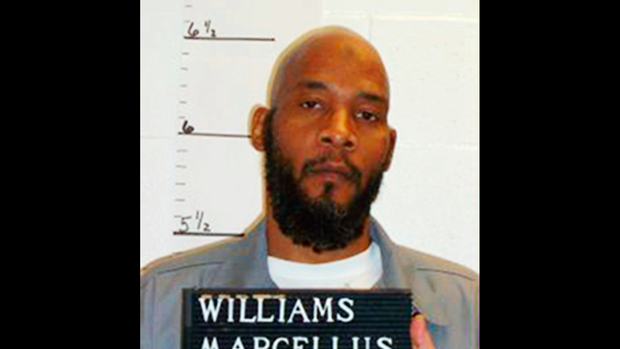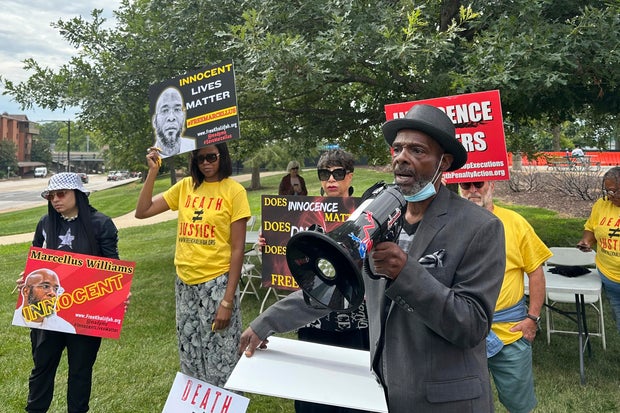CBS News
Judge rejects attempt to free Marcellus Williams, Missouri inmate facing execution

A judge on Thursday declined to vacate the conviction and sentence of Marcellus Williams, a condemned inmate in Missouri whose execution is scheduled for later this month. Williams’ case has drawn national attention as he faces the death penalty over the stabbing death of a woman in 1998, despite doubts about DNA evidence on the knife used in the attack and longstanding questions about whether his original trial was fair.
“Every claim of error Williams has asserted on direct appeal, post-conviction review, and habeas review has been rejected by Missouri’s courts,” wrote St. Louis County Circuit Judge Bruce Hilton. “There is no basis for a court to find that Williams is innocent, and no court has made such a finding. Williams is guilty of first-degree murder, and has been sentenced to death.”
Attorneys for Williams, the St. Louis County Prosecuting Attorney’s Office and the Missouri Attorney General’s Office did not respond to messages left Thursday seeking comment. Williams’ lawyers are expected to request clemency from Republican Gov. Mike Parson and could appeal further.
The latest decision came after the Missouri Supreme Court in August blocked an agreement that could have spared Williams’ life, instead calling a hearing to proceed on his innocence claim. Williams, now 55, has since his conviction maintained his innocence in the killing of Lisha Gayle, a social worker and former reporter for the St. Louis Post-Dispatch, who was found stabbed to death in her home in August 1998. He is set to be executed by lethal injection on Sept. 24.
Missouri Department of Corrections via AP
Hilton presided over an evidentiary hearing last month challenging Williams’ guilt, following his approval of a plan that allowed Williams to enter a new no-contest plea to first-degree murder. The inmate’s lawyers at the time said that he maintained his innocence but the plea acknowledged that evidence was sufficient for a conviction.
In January, Democratic St. Louis County Prosecuting Attorney Wesley Bell cited questions about DNA evidence on the murder weapon in seeking a hearing to consider vacating Williams’ conviction. Bell said the evidence indicated that someone else’s DNA was on the butcher knife used to kill Gayle, and he had asked the judge to vacate Williams’ murder conviction based on that testing.
Bell brought the challenge under a 2021 Missouri law that allows prosecutors to ask a court to review a conviction they believe is unjust. That and the setting of an execution date saw Williams facing the prospect of everything from having his conviction overturned and being set free, to having it confirmed and facing pending execution.
Despite Bell’s motion, the Missouri Supreme Court in June set the Sept. 24 execution date. An initial August hearing date was set on the motion by Bell involving questions over that DNA evidence, but just before it was set to take place, a new report revealed that the DNA evidence was contaminated because officials in the St. Louis County Prosecuting Attorney’s Office touched the knife without gloves before the original trial in 2001.
With the DNA evidence spoiled, lawyers working on behalf of Williams from the Midwest Innocence Project reached a compromise with the prosecutor’s office: Williams would enter a new, no-contest plea to first-degree murder in exchange for a new sentence of life in prison without parole.
Hilton signed off on the agreement. So did Gayle’s family. But the Missouri Attorney General’s Office did not.
At Republican Attorney General Andrew Bailey’s urging, the Missouri Supreme Court blocked the agreement and ordered Hilton to proceed with the evidentiary hearing on Aug. 28.
An attorney for Williams, Jonathan Potts, said during the hearing that the mishandling of the murder weapon was devastating for Williams because it “destroyed his last and best chance” to prove his innocence.
Jim Salter / AP
Hilton, in his ruling, agreed.
“In light of this report, (Williams) cannot demonstrate that the genetic material on the knife handle can form a basis for a ‘clear and convincing showing’ of Williams’ innocence,” Hilton wrote.
Assistant Attorney General Michael Spillane said other evidence pointed to his guilt.
“They refer to the evidence in this case as being weak. It was overwhelming,” Spillane said at the hearing.
Prosecutors at Williams’ original trial said he broke into Gayle’s home on Aug. 11, 1998, heard water running in the shower, and found a large butcher knife. When Gayle came downstairs, she was stabbed 43 times. Her purse and her husband’s laptop were stolen.
Authorities said Williams stole a jacket to conceal blood on his shirt. Williams’ girlfriend asked him why he would wear a jacket on a hot day. The girlfriend said she later saw the laptop in the car and that Williams sold it a day or two later.
Prosecutors also cited testimony from Henry Cole, who shared a cell with Williams in 1999 while Williams was jailed on unrelated charges. Cole told prosecutors Williams confessed to the killing and offered details about it.
Williams’ attorneys responded that the girlfriend and Cole were both convicted felons out for a $10,000 reward.
Three other men — Christopher Dunn, Lamar Johnson and Kevin Strickland — have been freed after decades in prison under the 2021 Missouri law.
Williams has been close to execution before. In August 2017, just hours before his scheduled death, then-Gov. Eric Greitens, a Republican, granted a stay after reviewing the same DNA evidence that spurred Bell’s effort to vacate the conviction.
A rising star in Missouri Democratic politics, Bell defeated incumbent U.S. Rep. Cori Bush in a primary this month and is heavily favored in the November general election.
Williams is Black and at the hearing, the man who prosecuted him, Keith Larner, was asked why the trial jury included just one Black juror. Larner said he struck just three potential Black jurors, including one who he said looked like Williams.
Williams’ trial attorney, Joseph Green, told Hilton that when Williams was tried, he also was representing a man who killed his wife and injured several others in a St. Louis County courthouse shooting in 1992. That case took time away from working on Williams’ defense, Green said at the hearing.
“I don’t believe he got our best,” said Green, now a judge.
CBS News
New York judge rejects Trump presidential immunity claim in “hush money” case

President-elect Donald Trump’s criminal conviction in state court remains on the books Monday, after a New York judge rejected an effort by Trump to have the case tossed based on a landmark Supreme Court ruling.
Justice Juan Merchan found that a July Supreme Court ruling granting Trump presidential immunity for official acts did not preclude a jury from finding him guilty after a criminal trial this spring.
Merchan wrote that evidence shown at trial pertained “entirely to unofficial conduct.”
This is a developing story and will be updated.
CBS News
Mystery drone sightings fuel spread of internet theories

As unexplained drone sightings along the East Coast trigger investigations and demands from officials for more information, a wave of online speculation has filled the void as amateur sleuths seek to solve the mystery themselves.
One Facebook group called “New Jersey Mystery Drones – let’s solve it” has surged to over 73,000 members in recent days, becoming a hub for users to share their drone sightings and speculate on the source of the mysterious activity.
George Gary, a New Jersey resident who joined the Facebook group, told CBS News that he was sitting in his car in Moorestown when he saw what he said were “multiple drones” in the sky. “I’m honestly not sure what’s behind them,” he said, speculating that it could be connected to government activity. “I’m really curious to find out.”
New Jersey resident Vanessa Grierson, who also said she has seen drones, told CBS News she joined the Facebook group to find out what others were seeing. “It’s alarming that there are still no answers,” she said.
Across social media, users have shared theories that range from foreign interference to UFOs to hobbyist activity.
The FBI and Department of Homeland Security issued a joint statement last week saying there is “no evidence at this time” that the reported drone sightings pose a threat to national security or public safety, or have any foreign connection.
But state and local leaders have been pushing for more information and a stronger response.
New Jersey Gov. Phil Murphy said Sunday he is urging federal authorities to allocate more resources to investigate the sightings, while New York Gov. Kathy Hochul announced that a drone detection system is being deployed in the state.
In some cases, people mistake planes for drones
The number of drones flying over the East Coast and the identity of those behind the activity remain unclear. White House national security spokesperson John Kirby said Monday that the FBI has received about 5,000 tips of reported drone sightings in the last few weeks, “about 100 of which they felt needed to be followed up on.”
Authorities say many of the reported drone sightings could be aircraft or helicopters operating from the region’s numerous airports, as residents increasingly turn their attention to the skies in search of answers.
New Jersey Sen. Andy Kim said he went on patrol with police on Thursday night to find out more about the drones. In a lengthy X thread, Kim said he “concluded that most of the possible drone sightings that were pointed out to me were almost certainly planes.”
Kirby said many other reports were determined to be “a combination of lawful commercial drones, hobbyist drones and law enforcement drones.”
In addition, unrelated videos have sparked confusion. On Friday, a video was widely shared and said to show a mysterious drone seemingly “shooting” at the ground. However, CBS News traced the footage to a military training exercise at Joint Base McGuire-Dix-Lakehurst.
People have also shared old videos from different contexts. One widely shared clip, allegedly showing drones over New York, is at least four years old.
Officials respond
Rep. Mike Waltz, a Republican from Florida who is President-elect Donald Trump’s pick for national security adviser, said on “Face the Nation with Margaret Brennan” that the lack of information highlights lapses in authority between local law enforcement and federal agencies like the Department of Defense and Department of Homeland Security.
“I think Americans are finding it hard to believe we can’t figure out where these are coming from,” Waltz said. “It’s pointing to gaps in our capabilities and in our ability to clamp down on what’s going on here. And we need to get to the bottom of it.”
Democratic Sen. Cory Booker of New Jersey said there is a “growing sense of uncertainty and urgency across the state” despite statements from federal investigators assuring residents that the drones do not pose public safety threats.
“As such, I urge you to share any relevant information about these drone sightings with the public,” Booker said. “Without transparency, I believe that rumors, fear, and misinformation will continue to spread.”
Shooting down drones?
Some social media users have suggested that they plan to shoot down the drones if they veer too close to their homes. President-elect Trump also suggested shooting down the drones, though he did not clarify who should take such action.
However, shooting down a drone is a federal crime.
The Federal Aviation Administration classifies drones as aircraft, meaning damaging or destroying them is a violation of the Aircraft Sabotage Act.
Beyond legal risks, firing at drones poses a serious safety hazard and could lead to injuries.
CBS News
TikTok CEO meets with Trump ahead of January ban

Washington — President-elect Trump is meeting with TikTok CEO Shou Chew on Monday at his Mar-a-Lago estate, according to sources familiar with the meeting.
The news was first reported by CNN.
A spokesperson for TikTok did not immediately respond to a request for comment.
At a news conference earlier Monday, Trump had warm words about TikTok and its near-term future.
“We’ll take a look at TikTok. You know, I have a warm spot in my heart for TikTok, because I won youth by 34 points. And there are those that say that TikTok has something to do with that,” Trump said when asked about how he would stop a ban. Harris won 54% of voters under 30, but Trump made inroads.
During his first term in the White House, Trump tried to ban the app.
President Biden earlier this year signed into law a bill passed by Congress requiring TikTok and its Chinese parent company, ByteDance, face a Jan. 19 deadline to cut ties or be banned in the U.S. The companies have tried to delay the deadline pending a Supreme Court review, but a federal appeals court, which upheld the law, denied the request last week. The companies asked the Supreme Court on Monday to temporarily pause the law.
“A modest delay in enforcing the Act will create breathing room for this Court to conduct an orderly review and the new Administration to evaluate this matter — before this vital channel for Americans to communicate with their fellow citizens and the world is closed,” the emergency application said.
The filing asked the Supreme Court to make a decision on the request by Jan. 6 so ByteDance and TikTok can “coordinate with their service providers to perform the complex task of shutting down the TikTok platform only in the United States” if the justices decline.
A 90-day extension could be granted if a sale is in process by the deadline. But TikTok has argued that a sale is unfeasible and the Chinese government opposes the sale of the algorithm which powers the app.












